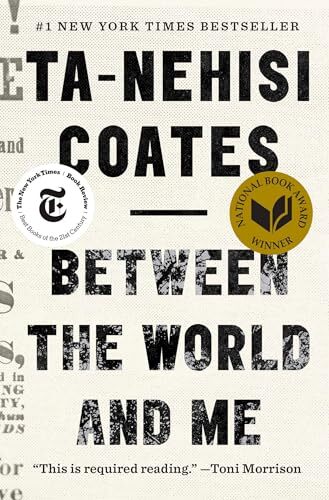
A strange, but moving book. It’s written in the format of letters to Coates’ son, so it feels like a stream of consciousness or a sermon, with beautiful, poetic writing in some parts, but without a clear structure. It’s a very personal story, and you often feel like you are spying on the conversation between a father and his child. In some ways, that makes the message more honest and powerful. In some ways, it makes the message confusing and uncomfortable.
The message is about racism in the US and how it’s not an aberration, an exception, or something that’s in our past, but a central part of the American legacy and tradition. The message is about how Coates, growing up in Baltimore, felt that his life—his body—was never safe and never under his own control, as it could be taken away at any time by a police officer or a prison or anyone with a gun. The message is about how Coates, now a parent, feels that his children are born in danger—born “endangered.”
It’s a short book that comes to an end suddenly, and it’s not clear what to take away. Perhaps nothing, as the book is written for his son, and not the rest of us. Coates doesn’t sugar coat anything, offer promises of hope, or provide any answers. But perhaps that is the point: to force us to see the world through his eyes and grapple with the questions.
Quotes
As always, I’ve saved a few of my favorite quotes while reading:
But race is the child of racism, not the father. And the process of naming “the people” has never been a matter of genealogy and physiognomy so much as one of hierarchy. Difference in hue and hair is old. But the belief in the preeminence of hue and hair, the notion that these factors can correctly organize a society and that they signify deeper attributes, which are indelible—this is the new idea at the heart of these new people who have been brought up hopelessly, tragically, deceitfully, to believe that they are white.
It is not necessary that you believe that the officer who choked Eric Garner set out that day to destroy a body. All you need to understand is that the officer carries with him the power of the American state and the weight of an American legacy, and they necessitate that of the bodies destroyed every year, some wild and disproportionate number of them will be black.
The truth is that the police reflect America in all of its will and fear, and whatever we might make of this country’s criminal justice policy, it cannot be said that it was imposed by a repressive minority. The abuses that have followed from these policies—the sprawling carceral state, the random detention of black people, the torture of suspects—are the product of democratic will. And so to challenge the police is to challenge the American people who send them into the ghettos armed with the same self-generated fears that compelled the people who think they are white to flee the cities and into the Dream. The problem with the police is not that they are fascist pigs but that our country is ruled by majoritarian pigs.
At the onset of the Civil War, our stolen bodies were worth four billion dollars, more than all of American industry, all of American railroads, workshops, and factories combined, and the prime product rendered by our stolen bodies—cotton—was America’s primary export.
Here is what I would like for you to know: In America, it is traditional to destroy the black body—it is heritage.
Black people love their children with a kind of obsession. You are all we have, and you come to us endangered. I think we would like to kill you ourselves before seeing you killed by the streets that America made. That is a philosophy of the disembodied, of a people who control nothing, who can protect nothing, who are made to fear not just the criminals among them but the police who lord over them with all the moral authority of a protection racket. It was only after you that I understood this love, that I understood the grip of my mother’s hand. She knew that the galaxy itself could kill me, that all of me could be shattered and all of her legacy spilled upon the curb like bum wine. And no one would be brought to account for this destruction, because my death would not be the fault of any human but the fault of some unfortunate but immutable fact of “race”, imposed upon an innocent country by the inscrutable judgment of invisible gods. The earthquake cannot be subpoenaed. The typhoon will not bend under indictment.
‘Black-on black crime’ is jargon, violence on language, which vanishes the men who engineered the covenants, who fixed the loans, who planned the projects, who built the streets and sold red ink by the barrel.
What I want you to know is that this is not your fault, even if it is ultimately your responsibility.
I believed, and still do, that our bodies are our selves, that my soul is the voltage conducted through neurons and nerves, and that my spirit is my flesh.
